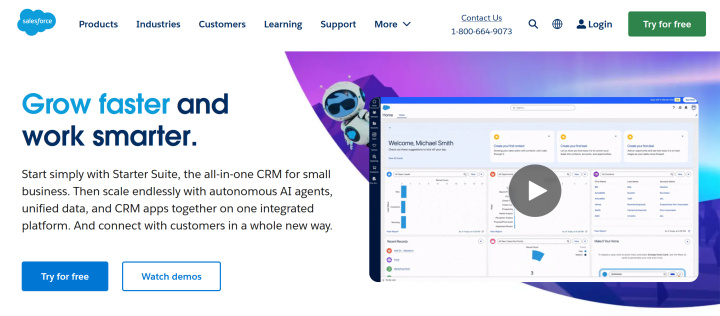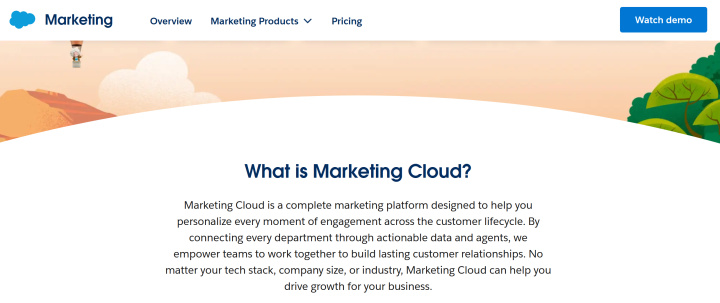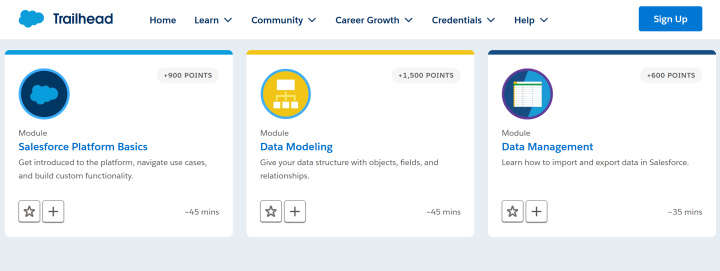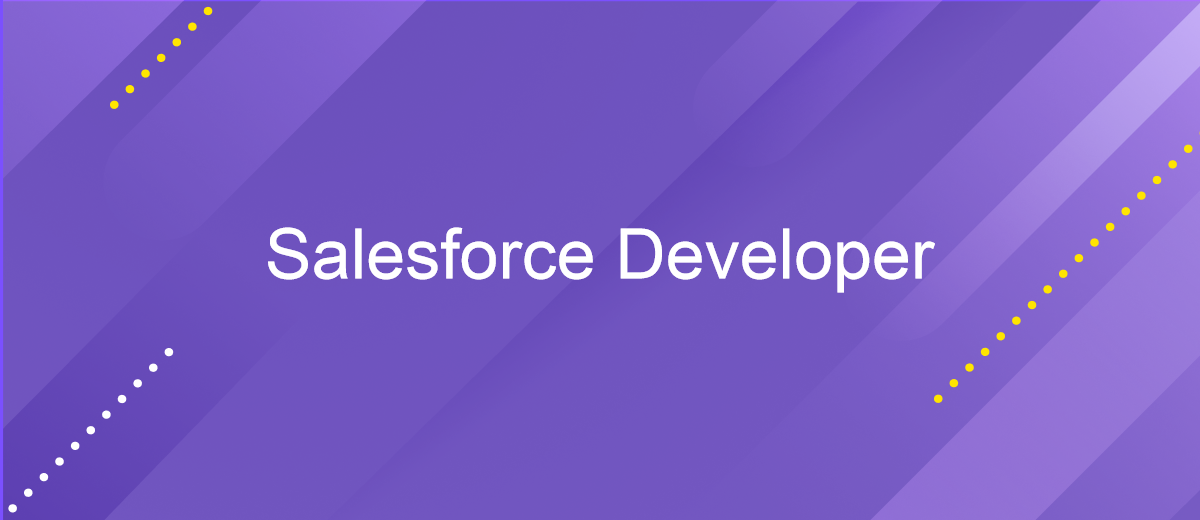Salesforce Developer: Key Skills, Tools, and Career Opportunities
In 2024, Salesforce is still considered the most popular CRM in the world. It is used by over 150,000 companies from various business sectors. Such a high popularity of the platform encourages users to integrate its software tools into their work processes. To solve this problem, companies hire individual specialists – Salesforce developers. In this article, we will tell you what they do, what skills and tools they use, what their career prospects are, and how to master this profession.
What Is a Salesforce Developer
A Salesforce developer is a full-stack programmer who creates software solutions using the Salesforce Platform, Lightning App Builder, and Heroku. They understand how the platform works and are able to customize and adapt its functionality to meet current customer needs and requirements.
The main area of activity is designing, developing, and implementing applications that are somehow related to the Salesforce ecosystem. Most of these developers are well-versed in both the internal logic of software and user interfaces.

If we break down what a Salesforce developer does, their priority responsibilities look like this:
- Studying customers' software in the context of fulfilling their tasks and satisfying their needs.
- Development of individual solutions based on Salesforce tools and testing of finished products.
- Creating flowcharts, diagrams, models, and visual instructions for software maintenance and updating.
- Identifying areas and opportunities for using their developments to meet the needs and objectives of the client company.
- Collaborating with developers, engineers, and other professionals to implement solutions based on the Salesforce platform.
Thus, the Salesforce developer job description involves writing software code for applications and interfaces using Visualforce and the Lightning Component Framework. Specialists use Apex, JavaScript, Python, and other modern programming languages for this. Moreover, they test the functionality of the software, identify errors, and prepare updates to eliminate them.
In addition to the technical part, this work involves live communication. Salesforce developers interact with their colleagues and other technical staff to plan joint developments and share experiences. Their responsibilities also include meetings with clients, during which they discuss tasks and present ready-made solutions.
- Automate the work of an online store or landing
- Empower through integration
- Don't spend money on programmers and integrators
- Save time by automating routine tasks
Essential Skills and Knowledge
To be successful, a Salesforce developer needs to have a wide range of professional competencies. Salesforce developer skills cover both technical knowledge, including programming languages and Salesforce ecosystem tools, and the ability to effectively use no-code solutions to simplify development. Equally important are the qualities that help interact with the team and find optimal approaches to completing tasks.
Programming Languages and Query Technologies
Languages JavaScript and Apex are key tools for working with the Salesforce ecosystem. JavaScript is used to develop the application interface (front-end) using Lightning web components. Apex is a server-side language used for back-end software development in the platform ecosystem. It is essential for implementing many of its features, including Prompt Builder and Einstein Copilot.
For Salesforce developers, knowledge of domain-specific query languages is definitely required. First of all, we are talking about Salesforce Object Query Language (SOQL) and Salesforce Object Search Language (SOSL). Both are necessary for working with data in the platform's multi-user database. SOSL is used to search for documents and other data, so it certainly won't be superfluous.
Programming Technologies
A Salesforce developer has to deal with a variety of programming languages and technologies necessary for developing and implementing products within the Salesforce ecosystem. For example, to integrate Salesforce with Slack using the Slack Bolt SDK, a specialist needs to master not only JavaScript but also Python.
A Salesforce Marketing Cloud developer specializes in creating and customizing marketing automation solutions using Salesforce Marketing Cloud tools. One of the critical skills for these professionals is AMPscript, a scripting language used for personalizing and automating content within emails and other marketing assets. Familiarity with AMPscript allows developers to create dynamic, customized email campaigns tailored to individual customer preferences.

Beyond Marketing Cloud, other areas of the Salesforce ecosystem require proficiency in their own specialized tools and languages. Salesforce developers working with MuleSoft need to know DataWeave for data transformation. SAQL is essential for setting up visualizations in Salesforce CRM Analytics, while SQL is indispensable for accessing data via Data Cloud.
No-Code Tools
The platform provides the ability to customize applications without requiring programming knowledge. Every developer should be proficient in using such tools effectively in their work. Some application functions, such as basic user interface (UI) settings, wizards, and security rules, are much easier to implement using no-code solutions.
There are also no-code tools that simplify the integration of Salesforce with external systems. For example, the ApiX-Drive online connector enables users to quickly set up integrations with hundreds of third-party platforms, streamlining workflows without the need for coding expertise.
Soft Skills
Salesforce developers need not only technical knowledge but also soft skills:
- Communication skills are of particular importance, which ensure effective interaction with colleagues, managers, and clients.
- Analytical skills help to accurately assess the tasks set and find optimal ways to complete them.
- Creativity allows you to develop new approaches to improving software and adapting it to customer requirements.
- Attention to detail ensures thorough testing of solutions and identification of possible shortcomings.
Salesforce Tools and Technologies
To be effective, a Salesforce developer must master a wide range of tools and technologies that form the foundation of the platform ecosystem. These tools help build, customize, optimize applications and interfaces, and manage data.
Key tools and technologies used by a specialist in their daily work:
- Salesforce Platform (formerly Force.com) is a PaaS platform for developing and deploying cloud applications and websites. It helps you build and maintain many types of enterprise and business software.
- Lightning App Builder is a key tool in the Salesforce ecosystem that makes it easy to develop and customize web pages and application components.
- Heroku is a cloud service that makes it easy to develop, deploy, and scale applications through its flexibility and ease of use.
- Apex. This server-side programming language is critical for developing the back-end portion of sites and applications in the Salesforce ecosystem. It can be used to create custom connectors, run custom API calls, and perform other system customizations.
- Visualforce is a platform for developing UI using XML syntax to generate HTML code.
- Lightning Web Components. A modern UI framework widely in demand for developing dynamic applications for mobile and desktop devices. It includes two sets of Lightning web components.
- Lightning Aura Components. This framework was previously widely used to create single-page applications and multi-level sectioned components. However, it is now considered a legacy framework and is gradually being replaced by the more modern and efficient Lightning Web Components (LWC), which offer better performance and flexibility.
- Salesforce Object Query Language (SOQL). The language required to search for information in Salesforce application databases.
- Salesforce Object Search Language (SOSL). This language allows developers to create text-based search queries and use them with the search index.
Career Opportunities for Salesforce Developers
A Salesforce developer is a very promising profession in 2024. Despite the active dynamics of the IT environment, it continues to remain in high demand. Thanks to these specialists, businesses can effectively interact with customers through advanced cloud technologies in the fields of marketing, sales, and service. The demand for Salesforce application developers is steadily increasing, reflecting the growing integration of the platform into the workflows of companies of different types, industries, and sizes.
The versatility of the profession opens up even broader career prospects. A broad technical background and full-stack expertise allow professionals not to be limited exclusively to the role of Salesforce platform developer. Instead, they can apply their knowledge and skills in various IT areas, developing and implementing software solutions within other popular business platforms. This gives specialists the opportunity to constantly improve their skills and gain new experience in the process of working on projects.
One of the important factors in the popularity of the profession is the Salesforce developer salary. According to Glassdoor, the average salary for such specialists in 2024 is $87,000 per year. Bonuses and other allowances offered by many employers increase this annual amount by an average of another $8,000.
The Salesforce developer job vacancy has a fairly wide salary range: from $62,000 to $117,000 per year. For the position of a developer in the sales department, you can find vacancies with a salary of over $130,000 per year. In general, this figure depends on the specialization and location of the company, as well as the experience and job responsibilities of the employee.
How to Become a Salesforce Developer

Being a Salesforce developer opens up a variety of career opportunities but requires dedication and solid preparation. Learning the platform’s core technologies, developing practical programming skills, and obtaining relevant certifications are important steps along the way.
Recommendations for successfully mastering the profession of Salesforce developer:
- Obtain a bachelor's degree in computer science or software engineering.
- Learn object-oriented programming and scripting languages (JavaScript, Apex, SQL) at an advanced level.
- Master Java, .NET framework, and C# at least at a basic level.
- Practice creating websites, mobile and web applications, and other software.
- Take an online or offline course for developers on the Salesforce platform. Get a certificate in the chosen specialization: Salesforce Certified App Builder, B2C Commerce Developer, Marketing Cloud Developer.
- Check out Trailhead, the official Salesforce learning platform.
- Pay special attention to the design of user interfaces.
- Gain competencies in data modeling and management.
- Learn about Salesforce Object Query Language (SOQL) and Salesforce Object Search Language (SOSL).
- Master the basic skills of developing and supporting customer communities.
- Find a mentor – an experienced Salesforce developer willing to share their knowledge and skills.
Conclusion
A developer of Salesforce plays a key role in optimizing business processes by adapting the functionality of one of the most popular CRMs to the tasks and needs of companies. Thanks to such specialists, more than 150,000 organizations around the world successfully integrate Salesforce tools into their operations, increasing the efficiency of sales, marketing, and customer service.
The popularity of the platform makes this profession one of the most sought-after on the labor market, opening up wide opportunities for career growth and professional development. The technical knowledge and practical experience of specialists ensure high-quality solutions to business problems and adaptation of software to constantly changing business requirements.
Remember that using our ApiX-Drive online connector, you can automate processes on your own without any coding or special skills required. Be sure to check out our step-by-step guides to set up the integrations:


